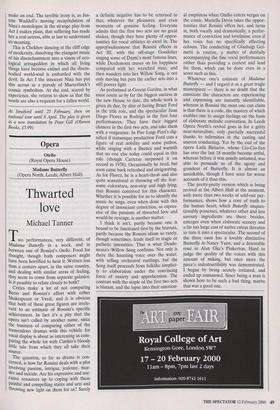Opera
Otello
(Royal Opera House)
Madame Butterfly
(Opera North, Leeds; Albert Hall)
Thwarted love
Michael Tanner
Two performances, very different, of Madama Butterfly in a week, and in between one of Rossini's Otello. Food for thought, though both composers might have been horrified to hear it. Written less than a century apart, in the same country, and dealing with similar areas of feeling, they seem to come from separate galaxies. Is it possible to relate closely to both? Critics make a lot of not comparing Berio and Rossini's effort with either Shakespeare or Verdi, and it is obvious that both of these great figures are irrele- vant to an estimate of Rossini's specific achievement. In fact it's a pity that the opera isn't called by another name, since the business of comparing either of the tremendous dramas with this vehicle for vocal display is about as interesting as com- paring the whole lot with Cinthio's bloody little tale from which they all take their source.
The question, so far as drama is con- cerned, is how far Rossini deals with a plot involving passion, intrigue, jealousy, mur- der and suicide. Are his expressive and nar- rative resources up to coping with these painful and compelling states and acts and throwing new light on them for us? Surely a definite negative has to be returned to that, whatever the pleasures, and even moments of genuine feeling. Everyone admits that the first two acts are no great shakes, though they have plenty of oppor- tunities for vocal athletes to excel in. The approfondissement that Rossini effects in Act III, with the off-stage Gondolier singing some of Dante's most famous lines, while Desdemona muses on his happiness compared with her wretched state, and then wanders into her Willow Song, is not only moving but puts the earlier acts into a still poorer light. As performed at Covent Garden, in what must count as by far the biggest success in the new House to date, the whole work is given its due, by dint of having Bruce Ford in the title role, and the spectacular Juan Diego Florez as Rodrigo in the first four performances. They have their biggest chances in the first two acts, and take them with a vengeance. In Pier Luigi Pizzi's dig- nified if statuesque production Ford cuts a figure of real nobility and some pathos, while singing with a fluency and warmth that no one else today could equal in this role (though Carreras surpassed it on record in 1978). Occasionally he tired, but soon came back refreshed and invigorating. As for Florez, he is a heart-throb and also quite sensational at throwing off the fear- some coloratura, non-stop and high lying, that Rossini contrived for this character. Whether it is possible for us to identify the music he sings, even when done with this degree of insouciant conviction, as expres- sive of the passions of thwarted love and would-be revenge, is another matter. I think it isn't, partly because one is bound to be fascinated first by the bravura, partly because the Rossini idiom so rarely, though sometimes, lends itself to tragic or pathetic intensities. That is. what Desde- mona's Willow Song confirms. Not only is there the haunting voice over the water, with telling orchestral rustlings, but the Song itself proceeds from folklike simplici- ty to elaboration under the convincing force of anxiety and apprehension. The contrast with the staple of the first two acts is blatant, and the lapse into their emotion- al emptiness when Otello enters verges on the comic. Mariella Devia takes the oppor- tunities that Rossini offers her, and turns in, both vocally and dramatically, a perfor- mance of conviction and loveliness, even if her voice has no specifically affecting colours. The conducting of Gianluigi Gel- metti is routine, a matter of dutifully accompanying the fine vocal performances rather than providing a context and lead for them, which can be done even in a score such as this.
Whatever one's estimate of Madama Butterfly — and I regard it as a great tragic masterpiece — there is no doubt that the emotions the characters are experiencing and expressing are instantly identifiable, whereas in Rossini the most one can claim is that there is a code, the mastery of which enables one to assign feelings on the basis of elaborate melodic convention. In Leeds Opera North's revival goes in for a gritty near-naturalism, only partially successful thanks to infirmities in the casting and uneven conducting. Yet by the end of the opera Lada Biriucov, whose Cio-Cio-San has over the last 18 months become artful, whereas before it was noisily untamed, was able to persuade us of the agony and grandeur of Butterfly. It is almost an unsinkable, though I have seen far worse accounts of it than this.
The pretty-pretty version which is being revived at the Albert Hall at the moment, with more than two weeks of sold-out per- formances, shows how a core of truth to the human heart, which Butterfly unques- tionably possesses, whatever other and less savoury ingredients are there besides, emerges even when elaborate scenery and a far too large cast of native extras threaten to turn it into a spectacular. The second of the three casts has a lovably diminutive Butterfly in Nancy Yuen, and a detestable roué in Alan Oke's Pinkerton. Hard to judge the quality of the voices with this amount of miking, but once more the piece's indestructibility was demonstrated. I began by being acutely irritated, and ended up unmanned. Since being a man is shown here to be such a bad thing, maybe that was a good one.


































































 Previous page
Previous page